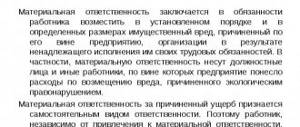Home / Labor Law / Responsibility / Material
Back
Published: 05/22/2016
Reading time: 11 min
0
2195
In the process of implementing labor relations and in realizing the rights and obligations of the employee and the employer, various types of responsibility arise between them.
The most common and significant of them is financial responsibility , which, due to the nature of their work, is assigned to some company employees. Depending on various characteristics and characteristics, this responsibility can be divided into many types, which are worth considering in more detail.
- Legislative framework and classification
- Classification by subject Deprivation of an employee of the opportunity to work illegally
- Causing damage to any property of a subordinate resulting from the employer’s guilty actions
- Delay in transferring wages and other types of payments that are due to an employee in accordance with current legislation
- Share
- Classification by scope of rights and obligations
Article 238. Financial liability of an employee for damage caused to the employer
The employee is obliged to compensate the employer for direct actual damage caused to him.
Lost income (lost profits) cannot be recovered from the employee. Direct actual damage is understood as a real decrease in the employer’s available property or deterioration in the condition of said property (including property of third parties located at the employer, if the employer is responsible for the safety of this property), as well as the need for the employer to make costs or excessive payments for the acquisition, restoration of property or compensation for damage caused by the employee to third parties.
(as amended by Federal Law No. 90-FZ of June 30, 2006)
Part three is no longer valid. — Federal Law of June 30, 2006 N 90-FZ.
Article 240. The employer’s right to refuse to recover damages from an employee
The employer has the right, taking into account the specific circumstances in which the damage was caused, to fully or partially refuse to recover it from the guilty employee. The owner of the organization's property may limit the specified right of the employer in cases provided for by federal laws, other regulatory legal acts of the Russian Federation, laws and other regulatory legal acts of the constituent entities of the Russian Federation, regulatory legal acts of local government bodies, and the constituent documents of the organization.
(as amended by Federal Law No. 90-FZ of June 30, 2006)
What does an employee owe to the company?
An employee who signs an employment contract accepts a number of obligations to the employer. According to Art. 21 of the Labor Code of the Russian Federation, personnel must:
- conscientiously perform official duties;
- maintain internal regulations and discipline;
- handle the property of the company, clients and colleagues with care;
- report accidents, fires, etc.
In practice, the staff is always dissatisfied with something, and some do not want to work at all and are negligent in their duties. Let’s say an employee punches through a product, is rude to customers, is late, or leaves the workplace early. And many carelessly use furniture, office equipment and other property of the organization. Like, you don’t feel sorry for your own people. The staff doesn't think that the company paid a lot of money for all this.
Fortunately, the law protects not only the rights of hired workers, but also of enterprises. And if you are not satisfied with how employees perform their duties or treat customers, you can punish them.
If you still have questions about employee responsibility, you can find answers to them in ConsultantPlus.
Full and free access to the system for 2 days.
Article 242. Full financial liability of the employee
The employee’s full financial liability consists of his obligation to compensate the direct actual damage caused to the employer in full.
(as amended by Federal Law No. 90-FZ of June 30, 2006)
Financial liability in the full amount of damage caused may be assigned to the employee only in cases provided for by this Code or other federal laws.
Employees under the age of eighteen bear full financial liability only for intentional damage, for damage caused while under the influence of alcohol, drugs or other toxic substances, as well as for damage caused as a result of a crime or administrative violation.
(as amended by Federal Law No. 90-FZ of June 30, 2006)
In what case is an employee not subject to punishment?
There are circumstances that cancel the employee’s financial liability for damage:
- force majeure (natural or social emergencies: natural disasters, military actions);
- normal economic risk, when, despite all the measures taken, the employee failed to preserve the entrusted property when achieving the work task, if it was not possible to do otherwise;
- extreme necessity - causing material damage in a situation of real danger, if the damage caused is commensurate with the prevented consequences;
- necessary defense - damage to the employer’s property in a situation of preventing danger associated with a risk to the life of an employee or other people;
- the fault of the employer, who did not provide employees with adequate conditions for storing accountable valuables (secured storage facilities, individual storage facilities, technical alarm systems).
Article 243. Cases of full financial liability
Financial liability in the full amount of damage caused is assigned to the employee in the following cases:
1) when, in accordance with this Code or other federal laws, the employee is held financially liable in full for damage caused to the employer during the performance of the employee’s job duties;
2) shortage of valuables entrusted to him on the basis of a special written agreement or received by him under a one-time document;
3) intentional infliction of damage;
4) causing damage while under the influence of alcohol, drugs or other toxic substances;
(as amended by Federal Law No. 90-FZ of June 30, 2006)
5) damage caused as a result of the employee’s criminal actions established by a court verdict;
6) damage caused as a result of an administrative violation, if established by the relevant government body;
7) disclosure of information constituting a secret protected by law (state, official, commercial or other), in cases provided for by federal laws;
(as amended by Federal Law No. 90-FZ of June 30, 2006)
 causing damage not while the employee was performing his job duties.
causing damage not while the employee was performing his job duties.
Financial liability in the full amount of damage caused to the employer can be established by an employment contract concluded with the deputy heads of the organization and the chief accountant.
(as amended by Federal Law No. 90-FZ of June 30, 2006)
Compensation according to the number of culprits
The onset of liability and penalties allows for a different number of participants, which is determined by the number of guilty persons and the degree of their guilt.
For example, if a young and inexperienced specialist warned the shop manager about his lack of experience in working with equipment, but the shop manager forced him to carry out a production operation that ended in a breakdown of the machine, the main blame will be assigned to the shop manager, and the degree of guilt of the subordinate will be considered in the context of the manager’s actions.
If, in a similar situation, an inexperienced specialist does not warn about his lack of qualifications for fear of dismissal or for other reasons, he will be charged with full responsibility.
Individual liability is determined by the guilty actions of one employee, which allows for the recovery of compensation from his personal income.
It comes under an agreement with citizens who have reached the age of 18; minors are involved in full compensation for harm caused in the following cases:
- When committing a crime or administrative offense resulting in damage.
- In case of intentional harm.
- When an act is committed in a state provoked by taking drugs or alcohol.
To determine the number of perpetrators, any situation requiring penalties is documented by an act of the commission and decided collectively. Determining the number of participants is influenced by:
- Pre-established rules imposing responsible behavior on the basis of collective or individual responsibility.
- The number of directly responsible persons who actually influenced the harm.
In the first case, circumstances are determined on the basis of an employment contract or individual acts. For example, if the head of the department was responsible for the integrity of equipment or furniture.
Such circumstances require the transfer of responsibility to the participants who directly influenced the commission of the unlawful act that led to the damage.
The number of perpetrators is determined on the basis of drawing up acts, official and explanatory notes that define certain actions of the parties as causal and requiring the imposition of penalties.
If the manager fails to identify the perpetrators, responsibility rests with him.
If material in the labor process cannot be distinguished, an agreement on collective (team) labor responsibility is concluded. This precedent makes it possible to divide compensation for damage or shortage of goods between all parties to the contract on the basis of Article 145 of the Labor Code of the Russian Federation.
The beginning of the procedure in which the team is involved is determined by the transfer of valuables to the participants in the labor process. Upon completion of work (services), material assets are determined:
- act of consumption of materials;
- invoice, etc.
In case of shortage or damage, the team or group of persons involved in the work will pay for the damage. It is determined in accordance with the real value of the lost goods or other property of the employer, divided by the number of participants.
Article 244. Written agreements on the full financial responsibility of employees
Written agreements on full individual or collective (team) financial liability (clause 2 of part one of Article 243 of this Code), that is, on compensation to the employer for damage caused in full for the shortage of property entrusted to employees, can be concluded with employees who have reached the age of eighteen years and directly servicing or using monetary, commodity values or other property.
(as amended by Federal Law No. 90-FZ of June 30, 2006)
Lists of works and categories of workers with whom these contracts can be concluded, as well as standard forms of these contracts, are approved in the manner established by the Government of the Russian Federation.
EXAMPLE
Due to an accident, a 5th grade student was injured during the educational process. The persons who committed violations were the physical education teacher and the director.
A disciplinary sanction in the form of a reprimand was imposed on the physical education teacher in accordance with Art. 192 of the Labor Code of the Russian Federation for violation of safety requirements when operating a gym outside of school hours, violation of Art. 28 clause 16 of Federal Law No. 273-FZ of the Russian Federation “On Education in the Russian Federation”.
The concluded employment contract does not provide for the full financial liability of the physical education teacher for damage caused to the employer. In this connection, the employee will bear financial responsibility for the damage caused within the limits of his average monthly earnings on the basis of Article 241 of the Labor Code of the Russian Federation.
That is, from the declared amount of damages (472,745 rubles 98 kopecks, including compensation for moral damage - 250,000 rubles), the physical education teacher will only reimburse the amount within his average monthly earnings (decision of the Venevsky District Court dated May 28, 2018 No. 2-168/2018).
At the same time, the rule on limited financial liability of an employee within the limits of his average monthly earnings is applied in all cases, except for those in respect of which the Labor Code of the Russian Federation or other federal law directly establishes a higher financial liability of the employee, in particular full financial liability.
LABOR DISPUTES
Article 245. Collective (team) financial liability for damage
When employees jointly perform certain types of work related to the storage, processing, sale (release), transportation, use or other use of valuables transferred to them, when it is impossible to differentiate the responsibility of each employee for causing damage and to conclude an agreement with him on compensation for damage in full, collective (team) financial liability may be introduced.
A written agreement on collective (team) financial liability for damage is concluded between the employer and all members of the team (team).
Under an agreement on collective (team) liability, valuables are entrusted to a predetermined group of persons, who are assigned full financial responsibility for their shortage. To be released from financial liability, a member of a team (team) must prove the absence of his guilt.
In case of voluntary compensation for damage, the degree of guilt of each member of the team (team) is determined by agreement between all members of the team (team) and the employer. When recovering damages in court, the degree of guilt of each member of the team (team) is determined by the court.
Kinds
The types of financial liability are legally differentiated from the position of the parties to the employment contract and the amount of damage caused and compensated.
From the perspective of the subject composition, a distinction is made between the financial liability of the employee (according to Articles 238-245) and the employer (according to the norms of Articles 234-237), as well as individual and team liability.
From the point of view of types of financial liability, a distinction is made between full (under Articles 242-245 of the Labor Code) and limited (under Article 241 of the Labor Code) financial liability. The basis for differentiating the two types is the degree of limitation on the amount of damages.
Article 246. Determination of the amount of damage caused
The amount of damage caused to the employer in the event of loss and damage to property is determined by actual losses, calculated on the basis of market prices prevailing in the area on the day the damage was caused, but not lower than the value of the property according to accounting data, taking into account the degree of depreciation of this property.
Federal law may establish a special procedure for determining the amount of damage subject to compensation caused to an employer by theft, intentional damage, shortage or loss of certain types of property and other valuables, as well as in cases where the actual amount of damage caused exceeds its nominal amount.
Article 248. Procedure for recovery of damages
Recovery from the guilty employee of the amount of damage caused, not exceeding the average monthly earnings, is carried out by order of the employer. The order can be made no later than one month from the date of final determination by the employer of the amount of damage caused by the employee.
If the month period has expired or the employee does not agree to voluntarily compensate for the damage caused to the employer, and the amount of damage caused to be recovered from the employee exceeds his average monthly earnings, then recovery can only be carried out by the court.
(as amended by Federal Law No. 90-FZ of June 30, 2006)
If the employer fails to comply with the established procedure for collecting damages, the employee has the right to appeal the employer’s actions in court.
An employee who is guilty of causing damage to the employer may voluntarily compensate for it in whole or in part. By agreement of the parties to the employment contract, compensation for damage by installments is allowed. In this case, the employee submits to the employer a written obligation to compensate for damages, indicating specific payment terms. In the event of dismissal of an employee who gave a written commitment to voluntarily compensate for damage, but refused to compensate for the specified damage, the outstanding debt is collected in court.
With the consent of the employer, the employee may transfer equivalent property to compensate for the damage caused or repair the damaged property.
Compensation for damages is made regardless of whether the employee is brought to disciplinary, administrative or criminal liability for actions or inactions that caused damage to the employer.
Variety of reimbursement methods
Material damage is compensated in several ways, including:
- compensation under the law;
- By the tribunal's decision;
- by order of the employer;
- under an employment contract;
- under contract;
- according to a one-time document.
Compensation according to the law follows when an official or other crime is committed, which requires special consideration within the framework of a criminal case. When it is initiated, evidence of damage caused is collected:
- criminal act of a person;
- inaction of a person at a time when he should have acted.
When criminal liability is recognized, material liability arises, without separate proceedings. And vice versa - a criminal exception exempts from penalties. In this case, it will be necessary to initiate separate legal proceedings based on other civil law grounds.
Judicial compensation is carried out on the basis of a court decision, issued by an extract and transferred to the accounting department, which will make deductions.
In the absence of such possibilities , the deduction will be made with the assistance of bailiffs, who, among other things, use the seizure of the property of the perpetrator. It is permissible to challenge a court decision by filing an appeal to the court of the second (and subsequent) instance.
The statute of limitations for an employee is 3 months from the moment the employee learned or should have known about a violation of his property rights. For the employer, the statute of limitations is 1 year.
By order of the employer, the employee may compensate for damage solely with his own consent. He will need to submit an application to the accounting department to make deductions for violations committed, in accordance with the employer’s decision to impose a penalty.
It is also permissible to make payments to the company's bank account. Other cases of claims for compensation are unacceptable and can only be regulated by consideration of the issue in court, on the basis of recognition of the claim.
An employment contract often imposes a predetermined financial liability . It is provided:
- for trade workers;
- for managers of households of organizations and enterprises;
- car mechanics and storekeepers;
- for senior nurses, housekeepers;
- pharmacists;
- librarians, etc.
Valuables are handed over to employees upon entering work or upon starting a shift. During shift changes or during dismissal and audits, the lack of goods and other valuables is identified by drawing up a report. It is permissible to demand compensation for damage on the basis of the act.
The agreement provides for a similar collection algorithm in relation to those property assets that are provided for in the agreement.
It is usually drawn up in cases where a certain amount of things, equipment or material providing a certain value is required to be provided to a person for production use, but the terms of the main employment contract did not provide for this.
Such agreements must be accompanied by acts of acceptance and transfer of items specified in the agreement.
One-time documents are provided on the basis of which a person is held liable. These documents include:
- invoices;
- transfer acts;
- special permissions.
They are issued for the intended purpose of direct legal proceedings of a property nature. Used when granting a power of attorney for representation in a specific production operation. When drawing up documents for receipt, but not registering the transfer of property, recovery is allowed.
If you need more legislative information, regulations and orders are at your disposal, as well as our analysis of the laws on this topic.








